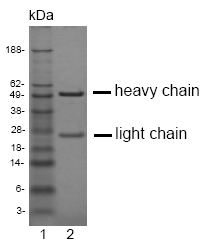Eph receptor A2 (EPHA2) Mouse Monoclonal Antibody [Clone ID: GM5H5]
Other products for "EPHA2"
Specifications
| Product Data | |
| Clone Name | GM5H5 |
| Applications | ELISA, FC, IF, WB |
| Recommended Dilution | Cell based ELISA with intakt, transiently transfected cells: 1/200-1/400. Flow cytometry: 1.2 µg/10e6 cells. Immunofluorescence: 1 µg/10e6 cells. ELISA (detection): With clone LA-4E7-D2 as capture antibody. |
| Reactivities | Human |
| Host | Mouse |
| Isotype | IgG1 |
| Clonality | Monoclonal |
| Immunogen | Genetic immunisation with cDNA encoding Human EphA2 |
| Specificity | Recognizes EphA2 receptor tyrosine kinase (EphA2). |
| Formulation | Phosphate buffered saline, pH 7.2 State: Purified State: Liquid purified Ig fraction. |
| Concentration | lot specific |
| Purification | Affinity Chromatography on Protein G. |
| Storage | Store the antibody undiluted at 2-8°C for one month or (in aliquots) at -20°C for longer. Avoid repeated freezing and thawing. |
| Stability | Shelf life: one year from despatch. |
| Gene Name | Homo sapiens EPH receptor A2 (EPHA2) |
| Database Link | |
| Background | EphA2 (Eph receptor tyrosine kinase A2) belongs to the Eph tyrosine receptor familiy, the largest receptor tyrosine kinase family of transmembrane proteins. It encodes a 130 kDA transmembrane protein which is primarily found in adult human epithelial cells (1). Eph receptors and their ephrin ligands are important mediators of cell-cell communication and play roles in embryonic patterning, neuronal targeting, and vascular development during normal embryogenesis (2,3). The Eph family of receptor tyrosine kinases is frequently overexpressed in a wide variety of cancers and tumor cell lines. In particular, EphA2 is overexpressed in prostate, lung and colon cancers and 40% of breast cancers and it represent an attractive potential target for drug design (3,4). |
| Synonyms | Ephrin type-A receptor 2, Epithelial cell kinase, Eph receptor A2 |
| Note | SDS-PAGE analysis: The antibody was purified by protein G affinity chromatography from cell culture supernatants and verified by SDS-Page (Figure.3). |
| Reference Data | |
| Protein Families | Druggable Genome, Protein Kinase, Transmembrane |
| Protein Pathways | Axon guidance |
Documents
| Product Manuals |
| FAQs |
{0} Product Review(s)
0 Product Review(s)
Submit review
Be the first one to submit a review
Product Citations
*Delivery time may vary from web posted schedule. Occasional delays may occur due to unforeseen
complexities in the preparation of your product. International customers may expect an additional 1-2 weeks
in shipping.






























































































































































































































































 Germany
Germany
 Japan
Japan
 United Kingdom
United Kingdom
 China
China





